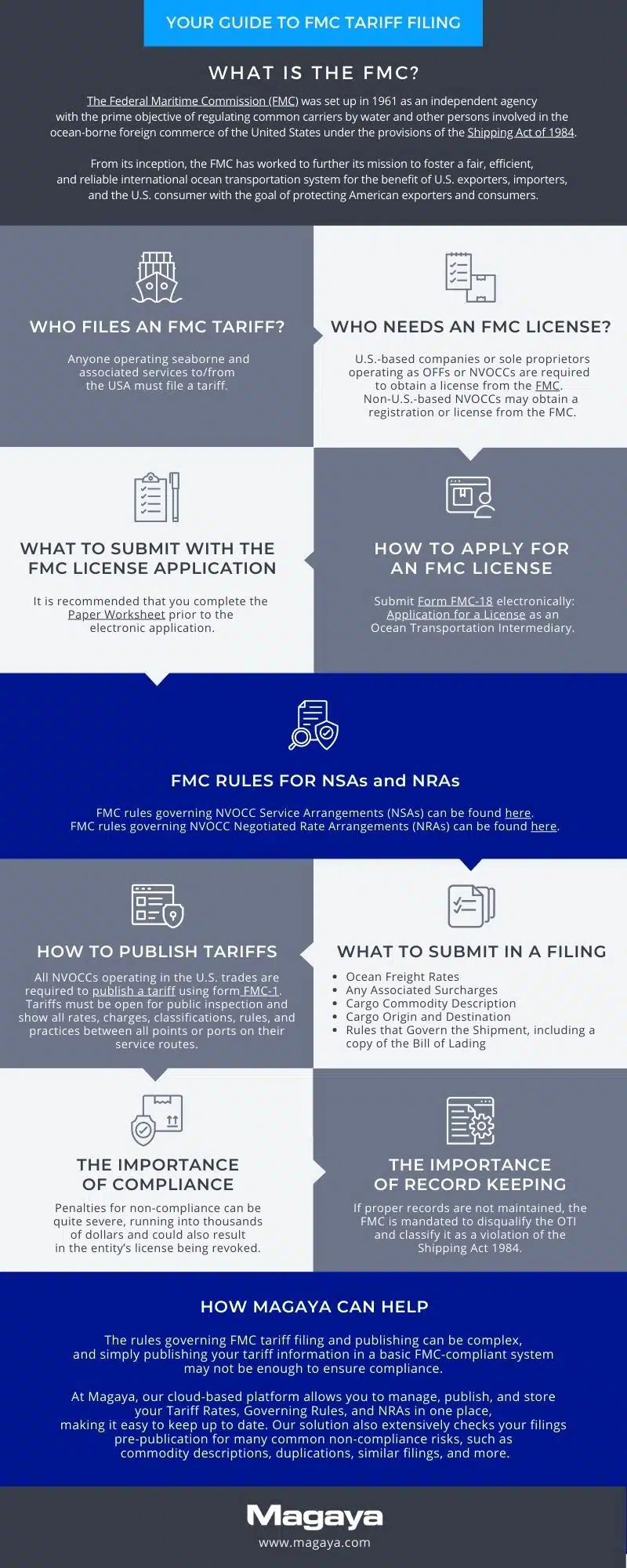FMC Tariff Filing Guide
FMC tariffs are the official documents that contain the rates, charges, terms, and conditions of ocean transportation services provided by ocean carriers and Non-Vessel Operating Common Carriers (NVOCCs). These tariffs are filed with the Federal Maritime Commission (FMC), which is the regulatory body responsible for overseeing ocean transportation in the United States. FMC tariffs provide transparency in the pricing and terms of service offered by ocean carriers and NVOCCs. Shippers and other interested parties can review these tariffs to understand the services offered, the charges associated with those services, and the terms and conditions of carriage.
The rules governing FMC tariff filing and publishing are complex, and simply publishing your tariff information in a basic FMC-compliant system may not be enough to ensure compliance. In this infographic, we summarize everything you need to know to ensure compliance for your FMC tariff filing.
Ready to digitize and modernize your FMC tariff filing operations?
See how Magaya can help.

What is the FMC?
The Federal Maritime Commission (FMC) was set up in 1961 as an independent agency with the prime objective to regulate common carriers by water and other persons involved in the ocean-borne foreign commerce of the United States under the provisions of the Shipping Act of 1984.
From its inception, the FMC has worked to further its mission to foster a fair, efficient, and reliable international ocean transportation system for the benefit of U.S. exporters, importers, and the U.S. consumer with the goal of protecting American exporters and consumers.
Who files an FMC tariff?
In short, anyone operating seaborne and associated services to/from the USA must file a tariff.
To elaborate, an FMC (Federal Maritime Commission) tariff is typically filed by ocean carriers or Non-Vessel Operating Common Carriers (NVOCCs) who are authorized to provide ocean transportation services for international shipments. These tariffs contain detailed information about the carrier’s services, rates, charges, and terms and conditions of carriage. The FMC requires that all common carriers and NVOCCs file their tariffs electronically for public review and approval, ensuring transparency and preventing discriminatory pricing practices. Shippers can refer to these tariffs to understand the services offered by the carrier and the associated costs involved in shipping their goods.
Who needs an FMS license?
U.S.-based companies or sole proprietors operating as OFFs or NVOCCs are required to obtain a license from the FMC. Non-U.S.-based NVOCCs may obtain a registration or license from the FMC.
What to Submit With the FMC License Application
If you are seeking a license from the Federal Maritime Commission (FMC) to operate as an ocean transportation intermediary (OTI), then you will need to submit a complete license application. In addition to the application form, there are a number of supporting documents that you will need to include. These typically include:
- Proof of citizenship or legal residency status in the United States.
- A copy of your business registration or incorporation documents.
- A detailed business plan, outlining your proposed operations, target market, and financial projections.
- A list of trade references and previous or existing customers.
- A certificate of insurance, demonstrating that you have obtained the required levels of liability insurance.
- A bond or other form of financial security, as required by the FMC.
- Payment of the application fee.
It’s important to ensure that your application and supporting documents are complete and accurate, as any missing or incorrect information can result in delays in the application process. You may also want to consult with an attorney or other expert to ensure that you are meeting all of the FMC’s requirements for obtaining an OTI license.
Because the requirements are extensive, it is recommended that you complete the Paper Worksheet prior to the electronic application.
How to Apply for an FMC License
Submit Form FMC-18 electronically: Application for a License as an Ocean Transportation Intermediary.
FMC Rules for NSAs and NRAs
FMC rules governing NVOCC Service Arrangements (NSAs) can be found here.
FMC rules governing NVOCC Negotiated Rate Arrangements (NRAs) can be found here.
How to Publish Tariffs
All NVOCCs operating in the U.S. trades are required to publish a tariff using form FMC-1.
Tariffs must be open for public inspection and show all rates, charges, classifications, rules, and practices between all points or ports on their service routes.
What to Submit in a Filing
- Ocean Freight Rates
- Any Associated Surcharges
- Cargo Commodity Description
- Cargo Origin and Destination
- Rules that Govern the Shipment, including a copy of the Bill of Lading.
The Importance of Compliance
Penalties for non-compliance can be quite severe running into thousands of dollars and could also result in the entity’s license being revoked.
The Importance of Record Keeping
If proper records are not maintained, the FMC is mandated to disqualify the OTI and classify it as a violation of the Shipping Act 1984.
How Magaya Can Help With FMC Tariff Filings
The rules governing FMC tariff filing and publishing can be complex, and simply publishing your tariff information in a basic FMC-compliant system may not be enough to ensure compliance.
Magaya Rate Management allows you to manage, publish, and store your Tariff Rates, Governing Rules, and NRAs in one place, making it easy to keep up to date. Our solution also extensively checks your filings pre-publication for many common non-compliance risks, such as commodity descriptions, duplications, similar filings, and more.
Ready to digitize and modernize your FMC tariff filing operations?
See how Magaya can help.